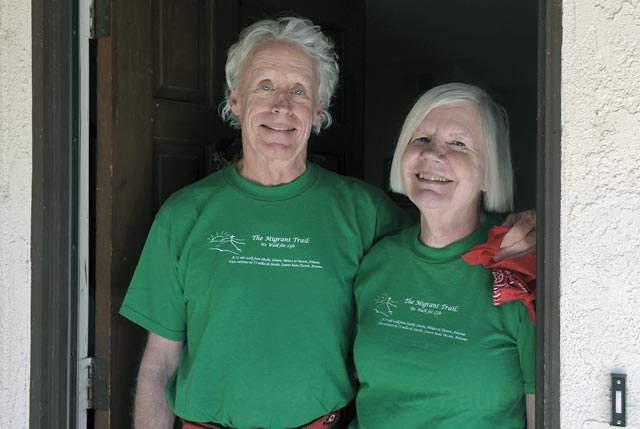Marching for Migrants
S.B. Clerics Take On Devil’s Highway

Art and Judy Stevens, quasi-retired Episcopal ministers, kicked off the summer with a 75-mile trek through the Sonoran Desert, marching from the small Mexican border town of Sasabe to Tucson, Arizona, to better appreciate the perilous journey traversed by untold thousands of immigrants into the United States each year. They succeeded, sort of.
By their own admission, the Stevenses had it extremely cushy compared to most immigrants making the border crossing. They were two of the 70 people — mostly committed liberals rooted in faith-based communities — to participate in the eighth annual Derechos Humanos walk. As such, the two enjoyed such perks as food, water, and shelter. Most migrants make the crossing with a gallon or two of water. “In seven days, I drank 112 gallons of water and Gatorade,” Art Stevens said. He came equipped with high-end walking shoes. “By the end of the first day, I had 12 blood blisters on my feet.”
Although the marchers encountered one angry, shotgun-wielding Arizona rancher, who ordered them off his property — and to go back to California — the Stevenses and other marchers did not have to worry about getting caught by the Border Patrol or being murdered, robbed, or raped by any of the many predators dogging the migrants’ route. They did not experience fear. But each of the marchers was given a name of someone who died attempting to make the trip. This year, at least 88 people perished. Each of the marchers walked single file, carrying a cross. For the first 90 minutes, they walked in solemn silence into the 100-degree heat. When a march leader called out the name of one of the dead, the marchers would shout back “Prevente!” in unison.
For the Stevenses, card-carrying social-justice activists with organizations like PUEBLO, the march did not open their eyes as much as it sharpened their focus. “You can spout off about immigration all you want, but being out there gave the issue a whole new perspective,” said Judy Stevens. “My level of commitment, my passion, has grown exponentially,” added her husband. When the Stevenses moved to Santa Barbara seven years ago from Massachusetts — they met in the 1970s as high-powered researchers on Capitol Hill and then left together for the seminary — they wasted little time getting involved in progressive politics. They’ve supported such causes as the living-wage ordinance, homeless rights, and the Dream Act. They are now busy fighting the Secure Communities program in which Mexican nationals accused of crimes — many low-level — are held in county jail and then deported back to Mexico.
The Stevenses make no bones about their politics. They believe what they believe and understand that not everyone shares their convictions. Immigrants in the United States illegally, said Judy, are coming from a land with no jobs to take jobs no one else wants. They have no rights and are ripe for the rankest exploitation. “It’s a matter of human dignity,” said Art. “These people need to be seen, heard, and spoken to. It’s the least we can do.” Since returning, the Stevenses have shown slide shows of their experience at local churches. They even met with about 30 more affluent residents of Puerto Vallarta, Santa Barbara’s sister city in Mexico. One observer described the Mexicans’ reaction as curious, polite, but decidedly aloof to the Stevenses’ emotional fire.
During the trip, the couple and their fellow marchers got up around three in the morning, when it was still cool, and marched until noon. They scrupulously left no trash behind; even their waste was scooped up, placed in plastic bags, and hauled away. Along the way, they encountered no drug smugglers, no immigrants either. “If an immigrant came upon us and asked for help, we could offer them water and ask them if they wanted us to call Border Patrol,” said Art. “Under the law, we couldn’t even tell them where Tucson is. That’s illegal.”
When the marchers pulled into Tucson, they were greeted at a park with food, music, and drink. “I felt guilty and humbled,” said Art. “I knew I hadn’t gone through a typical immigrant experience, but I had more of a sense of what that reality was.”



